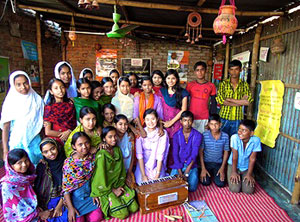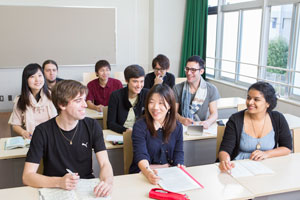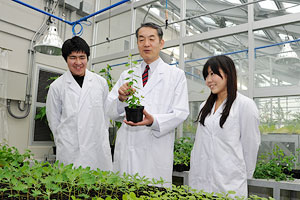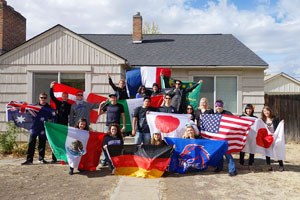Hosei University Globalization Policy Contributing to the Makings of a Peaceful and Sustainable Global Society
I Introduction
Ever since its inception, Hosei University has adhered to its founding principles of Liberty and Progress in educating individuals able to meet the challenges of new problems as they arise, with innovative thinking and ideas. In fact, the University has accepted students from Asia early on, and these students have become leading pioneers in their home countries.
In 10 years, in 2023, the University sees itself as a result of its Globalization Policy as a truly Open University-- one that is open to the world, to the public, to innovative ideas--a University committed to contributing to the makings of a peaceful and sustainable global society
II Aims/Objectives
- Educating individuals capable of working and living anywhere in the world
- Creating a global campus with the expansion of the University’s international students and exchange student programs
- Improving and internationalizing its academic and research structure
- Creating global and global related networks with alumni, high schools and other communities
III Globalization Project 25
1 Educating individuals capable of working and living anywhere in the world
1.Increasing the number of courses given in foreign languages
Internationalizing the curricula so that 10% of all classes are conducted in a foreign language as well as adding both interactive distance education with overseas universities and Japanese and English bilingual seminars. Moreover, some courses in foreign languages designated Global Open Courses are to be made available University-wide.
2.Improving and increasing the number of courses in English for a diploma
In addition to the courses of Faculty of Global and Interdisciplinary Studies (GIS), 3 English-based undergraduate and 3 graduate programs will be offered.
3.Establishing courses for a sustainable society
Renewing quality and content of courses in the 15 faculties and opening them up to the university as a whole in order to provide education leading to the foundation of peaceful and sustainable global society.
4.Establishing problem solving field work courses
Establishing programs in which international students alongside Japanese students learn about problems Japan faces in the field.
5.Developing advanced language communication capability
Increasing the number of small classes divided according to level of proficiency. The aim is for all students to attain a higher level of proficiency with the ERP (English Reinforcement Program) and upper level courses held in English-- the goal of CEFR B1 (TOEFL®ITP500) level.
6.Expanding the international volunteer and internship programs
Expanding the University’s international volunteer and internship programs by utilizing what has been learned from previous programs.
7.Promoting continuing education
Establishing ties with business, NPOs, international organizations, international business personnel for short term intensive courses.

2 Creating a global campus with the expansion of the University’s international student and exchange student programs
8.Expanding studying abroad programs
Increasing the amount of Studying Abroad (SA) programs and their respective number of credits/units.
9.Expanding the number of institutions which the University has agreements with to 250
Increasing the number from the present 130 universities and institutions with mutual agreements to 250.
10.Increasing the number of overseas offices (to 6 hubs)
Extending overseas offices?at present in China and Taiwan only--to Indonesia, Thailand, Viet Nam and South Korea.
11.Realizing an international student population of 3000
Using a variety of entrance examination systems and adding more courses for credit in English as means of increasing the number of international students to 2000; increasing the number of students involved in short-term practical Japanese Language training and cultural experience, and experiential learning programs to 1000.
12.Augmenting the accepting of international students
Augmenting the accepting of international students by improving scholarship systems, facilities and amenities with regard to religion and culture, providing high level advisors on global employment opportunities, and strengthening Japanese Language education.
13.Providing and outfitting dormitories for international students
Providing and outfitting dormitories for international students (students of all backgrounds and nationalities) and learning accommodations for short term trainees.
14.Reforming the entrance examination system vis a vis globalization
Introducing examination systems in preparation for an International Baccalaureat, including English examinations prepared by other organization, as well as those focusing on international experiences.

3 Improving and internationalizing the University’s academic and research structure
15.Providing for leading edge research facilities
Actively promoting and facilitating international research cooperation by computerizing and then making public archival literature and research material with Japan’s history, environment and culture as research base.
16.Promoting integration of humanities and science in sustainability research
Disseminating international standard research findings with an integrated core of humanities and science in sustainability research.
17.Synchronizing with recognized international education systems
Introducing an academic calendar similar to those used abroad, course numbering systems and the publishing of course catalogs in English; and the providing of the internationally recognized AACSB in the Business School.
18.Promoting internationalization of educators
Improving the presence of Japanese educators on the world stage, increasing the numbers of international educators, graduates of foreign universities, those with over one year of overseas academic research to 60%.
19.Internationalizing staff
Increasing the number of staff with language ability in English, Chinese, or Korean to 50% especially with regard to overseas training.
20.Strengthening IR functions
Strengthening IR (Institutional Research) functions to improve the quality of academic research.

4 Creating global and global related networks with graduates, high schools and other communities
21.Developing global student cooperation
Increasing Japanese student support of international students, support of students of international schools in Japan, support of students of Japanese schools overseas.
22.Promoting international relations through university sports
Engaging support for the upcoming 2020 Tokyo Olympics and Paralympics in various ways for this national endeavor.
23. Tie-ups with 110 national and international high schools
Initiating tie-ups with Japanese high schools (100) and Asian high schools (10) promoting global sustainability.
24. Strengthening tie-ups with the Affiliated High Schools
Strengthening tie-ups with the Affiliated High Schools even more, with the “Pre-college Program” (Program to attract promising students as global leaders in the linking up period between University and high school).
25. Forming a global network of alumni
Setting up of 20 hubs where alumni can congregate in Hosei Meetings held throughout the world; gathering of and publicizing the career experiences of 1000 Hosei graduates’ activities on the world stage.

IV Implementation System
To achieve the aims and realize the objectives of the Globalization Project 25, the University President as Head has established the Global Strategy Headquarters with the whole University actively promoting globalization in toto.
Note: This is a translation.

